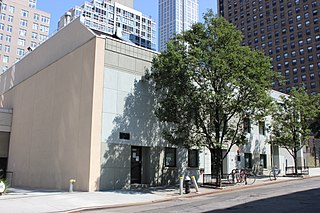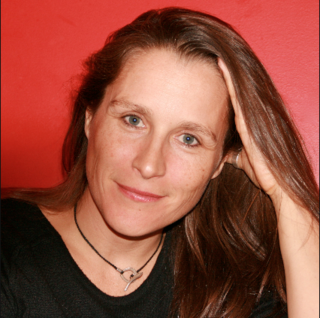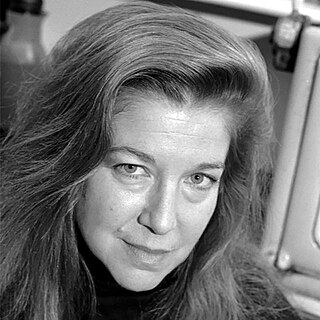
The Wexner Center for the Arts is the Ohio State University's "multidisciplinary, international laboratory for the exploration and advancement of contemporary art."

Shirley Clarke was an American filmmaker.
Outside TV is a sports-oriented cable and satellite television network based on Outside magazine. The network features programming related to various outdoor activities and the lives of those who engage in them. High-definition programs appear on the company's cable, satellite and broadband providers’ sports and entertainment offerings.
Paper Tiger Television (PTTV) is a non-profit, low-budget public access television program and open media collective based in New York City. Currently operating from Brooklyn, PPTV was co-founded by media activist and Academy Award nominated documentary filmmaker Dee Dee Halleck in 1981. It focuses on raising media literacy and exists as a protest to corporate control over broadcast mediums.

Manhattan Neighborhood Network (MNN) is an American non-profit organization that broadcasts programming on five public-access television cable TV stations in Manhattan, New York City. MNN operates two community media centres – in midtown Manhattan and East Harlem – and provides facilities to community producers and organizations who want to create programming to air on one of MNN's five channels. It is considered to be the largest community media center in the United States.
Lynn Tomlinson is an animator and artist. She is a professor at Towson University. She lives in Baltimore, MD, with her husband, Craig J Saper, and her family. She has taught at Cornell University, the University of the Arts in Philadelphia, Maryland Institute College of Art, and Delaware College of Art and Design, Richard Stockton College, and Tufts University. Her films have been screened at film festivals around the world over the past two decades. She has received awards and grants including several Mid-Atlantic Emmys, an ITVS production grant, and Individual Artist Fellowships from the State Arts Councils of Pennsylvania, Florida, and Maryland.
Shemaroo Entertainment Ltd. is an Indian content creator, aggregator and distributor, specifically in the media and entertainment industry. It was founded by Buddhichand Maroo in 1962 as a book-circulating library under the name Shemaroo. It set up India's first video rental business in 1979. The company went national after it began content distribution in 1987, became aggregators and bought rights to movies for home video.
Cinephilia is the term used to refer to a passionate interest in films, film theory, and film criticism. The term is a portmanteau of the words cinema and philia, one of the four ancient Greek words for love. A person with a passionate interest in cinema is called a cinephile, cinemaphile, filmophile, or, informally, a film buff. To a cinephile, a film is often not just a source of entertainment as they see films from a more critical point of view.
Renee Tajima-Peña is an American filmmaker whose work focuses on immigrant communities, race, gender and social justice. Her directing and producing credits include the documentaries Who Killed Vincent Chin?, No Más Bebés, My America...or Honk if You Love Buddha, Calavera Highway, Skate Manzanar, Labor Women and the 5-part docuseries Asian Americans.
Jesse Drew is an American artist, author, media activist, and educator.

Tami Kashia Gold is a documentary filmmaker, visual artist and educator. She is also a professor at Hunter College of the City University of New York in the Department of Film and Media Studies.

Catherine Gund is an American producer, director, and writer who founded Aubin Pictures in 1996.
Ariel Maria Dougherty is an American independent film maker, feminist media advocate and activist. She is best known as the co-founder of non-profit media arts organization Women Make Movies. In recent years she has written extensively about the intersections of women's rights and media justice and the need for increased support for both.
Parry Teasdale is an American video artist and a founding member of the early video collective Videofreex. He was also involved with Lanesville TV, one of the first unlicensed TV stations, throughout the 1970s.
Kathy Rae Huffman is an American curator, writer, producer, researcher, lecturer and expert for video and media art. Since the early 1980s, Huffman is said to have helped establish video and new media art, online and interactive art, installation and performance art in the visual arts world. She has curated, written about, and coordinated events for numerous international art institutes, consulted and juried for festivals and alternative arts organisations. Huffman not only introduced video and digital computer art to museum exhibitions, she also pioneered tirelessly to bring television channels and video artists together, in order to show video artworks on TV. From the early 1990s until 2014, Huffman was based in Europe, and embraced early net art and interactive online environments, a curatorial practice that continues. In 1997, she co-founded the Faces mailing list and online community for women working with art, gender and technology. Till today, Huffman is working in the US, in Canada and in Europe.
GoNightclubbing is a collaboration between video artists Pat Ivers and Emily Armstrong, who worked together to document the New York punk rock scene beginning in 1977. Ivers had previously worked with Metropolis Video from 1975 until their dissolution in 1977. Originally, Ivers and Armstrong were known as Advanced TV, but they incorporated as GoNightclubbing in 2001.

Joan Braderman is an American video artist, director, performer, and writer. Braderman's video works are considered to have created her signature style known as "stand up theory." Via this "performative embodiment," she deconstructs and analyzes popular media by inserting chroma-keyed cut-outs of her own body into appropriated mass media images, where she interrogates the representation of ideology and the transparency of photographic space in U.S. popular culture.

Nathalie Magnan was a media theoretician and activist, a cyber-feminist, and a film director. She taught at both universities and art schools, and is known for initiating projects linking Internet activism and sailing with the Sailing for Geeks project. She also co-organised the Los Angeles Gay and Lesbian Film Festival in 1984. She died at home of breast cancer.
Surabhi Sharma is a filmmaker, educator and curator, based in Mumbai, India. She has worked on several feature-length documentaries apart from some short fiction films and video installations. Her key concern has been documenting cities in transition through the lens of labour, music and migration, and most recently reproductive labour. Cinema verite and ethnography are the genres that inform her filmmaking.,
Deep Dish Television was the first public access television distribution network in the United States. Created in 1986 by Paper Tiger Television and based in New York City, the network was committed to exploring new and democratic ways of promoting video artwork and reporting. Their programs connected artists, independent videomakers, programmers, and social activists, and covered political topics such as the environmental movement, U.S. healthcare, and the Iraq War.






